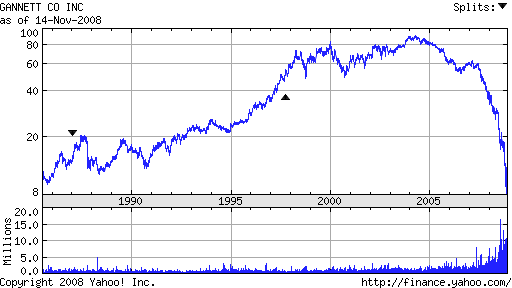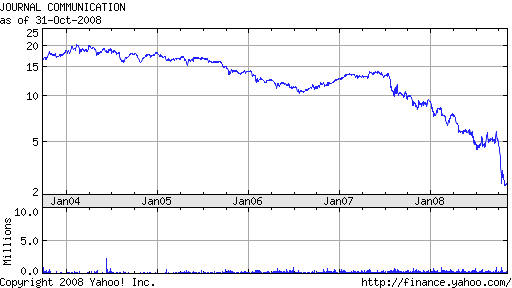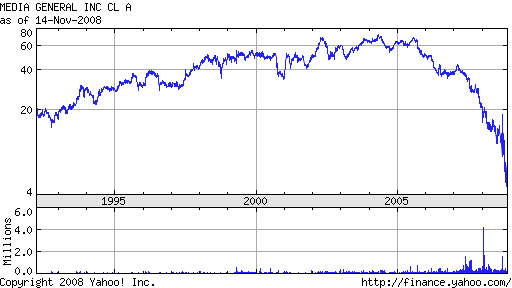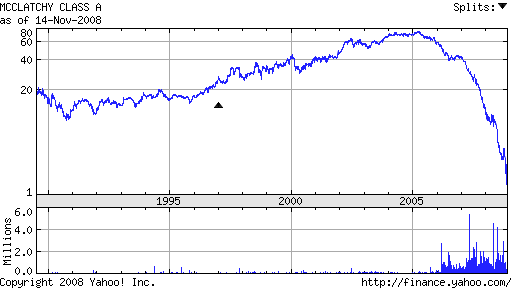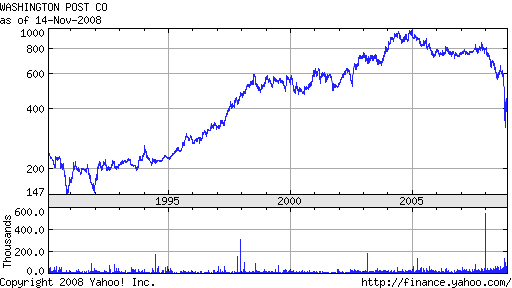The Balance Sheet
Put simply, American newspaper companies have too much debt, and have been fooling themsevles about how much equity they have. When they went through that period of consolidation a few years back, the surviving (so far) companies vastly overpaid for the properties they bought, thinking that either they could turn them around or that the names would translate into sales. Then they borrowed agains these "assets," and have thus robbed themselves of whatever flexibility they had.
Here are the assets of the seven companies we've been looking at so far:
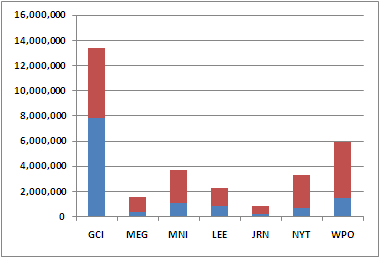
The bars represent the total assets. The blue represents something called, "Goodwill," the red, everything else. Goodwill is, roughly speaking, the vigorish that you pay for a company. Essentially, according to accounting rules, you're not allowed to pay more for something than it's worth. What you pay for it is what it's worth. So if you pay $4 million for a company whose net assets are valued at $3 million, after the buyout you put down the extra $1 million as an asset called, "Goodwill." It can generously be interpreted as extra cash you think the property should generate over time.
But it's a guess, an estimation, and can also serve as a slush line item to hide the fact that you just overpaid by 50% for a name that isn't generating any ad revenue any more, but that People Trust. It used to be that Goodwill was amortized over a period of time. Now, it has to be re-examined as often as necessary, and written down as appropriate.
Let's take a look at what's going to happen, as accountants realize that if the New York Times can't sell ad space, neither will the Podunk Press they sunk $2.5 extra large into five years ago, and that all the Goodwill in the world isn't going to change the fact that Iowans are getting their news from here and their local advertising from here.
The other rule here, so basic it's been known since the Italian Renaissance as the Accounting Rule is that Assets = Liabilities + Equity. If I write down an asset, I also need to subtract a like amount from either liabilities or equity. Since Goodwill isn't exactly a loan, likely it'll come out of equity. Here are the Owners' Equity lines from these companies, before and after Goodwill is subtracted:
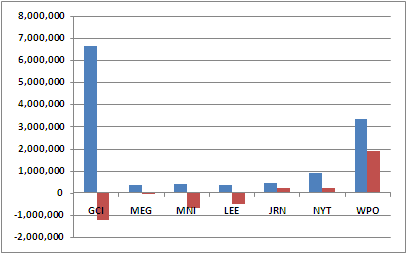
That's right, boys and girls. Four of these Titans of Type go from having positive equity to negative equity, meaning they owe more than their companies are worth. And this is a completely defensible assessment. Given the current market, and the likelihood of how these will develop, you can't sell that Goodwill on the open market, because people apparently have resorted to paying what things are worth.
Now all of these companies have some long-term debt, although the Washington Post company seems to have made an effort to pay its down to minimal levels. Typically, I don't want debt-to-equity to be more than about 1. I know, there was a time not so very long ago when investors liked leverage. Because after all, we'd always be able to refinance that, wouldn't we? But I was never comfortable with huge debt-equity ratios.
Naturally, the D-E are calculating including Goodwill. Here's what happens when you subtract the Goodwill from the equity, and recalculate:
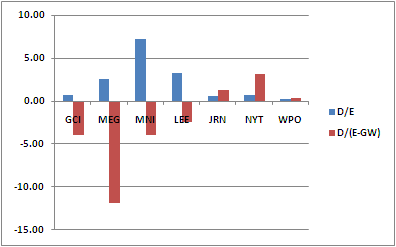
Not much fun. Of course, four of them go from positive to negative, including USA Today, which looked safe. The Journal newspapers only edge up to 1.30, and the NY Times - whoa, there, Pinch! - run up from a safe-looking 0.75 to almost 3.2. Only the Washington Post manages to stay sober.
These companies have been fooling themselves about the state of their balance sheets, believing that they had better balance than they did, because they were counting on revenues that will never materialize.
Now, I know what you're thinking. Debt's ok if you can pay it. Well, as we'll see next time, that's a problem, too.







